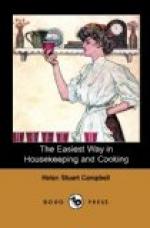COFFEE.
The best coffee is made from a mixture of two-thirds Java and one-third Mocha; the Java giving strength, and the Mocha flavor and aroma. The roasting must be very perfectly done. If done at home, constant stirring is necessary to prevent burning; but all good grocers use now rotary roasters, which brown each grain perfectly. Buy in small quantities unground; keep closely covered; and if the highest flavor is wanted, heat hot before grinding.
A noted German chemist claims to have discovered an effectual antidote to the harmful effects of coffee,—an antidote for which he had searched for years. In his experiments he discovered that the fibre of cotton, in its natural state before bleaching, neutralizes the harmful principle of the caffein. To make absolutely harmless coffee which yet has no loss of flavor, it is to be boiled in a bag of unbleached cheese-cloth or something equally porous. In the coffee-pot of his invention, the rounds of cotton are slipped between two cylinders of tin, and the boiling water is poured through once or twice, on the same principle as French filtered coffee. The cloths must be rinsed in hot and then cold water daily and carefully dried; and none are to be used longer than one week, as at the end of that time, even with careful washing, the fibre is saturated with the harmful principle. The same proportions of coffee as those given below are used, and the pot must stand in a hot place while the water filters through.
For a quart of coffee allow four heaping tablespoonfuls of coffee when ground. Scald the coffee-pot; mix the ground coffee with a little cold water and two or three egg-shells, which can be dried and kept for this purpose. Part of a fresh egg with the shell is still better. Put into the hot coffee-pot, and pour on one quart of boiling water. Cover tightly, and boil five minutes; then pour out a cupful to free the spout from grounds, and return this to the pot. Let it stand a few minutes to settle, and serve with boiled milk, and cream if it is to be had. Never for appearance’s sake decant coffee. Much of the flavor is lost by turning from one pot into another, and the shapes are now sufficiently pretty to make the block tin ones not at all unpresentable at table.
Where coffee is required for a large company, allow a pound and a half to a gallon of water.
Coffee made in a French filter or biggin is considered better by many; but I have preferred to give a rule that may be used with certainty where French cooking utensils are unknown.
COCOA, BROMA, AND SHELLS.
The directions found on packages of these articles are always reliable. The cocoa or broma should be mixed smoothly with a little boiling water, and added to that in the saucepan; one quart of either requiring a pint each of milk and water, about three tablespoonfuls of cocoa, and a small cup of sugar. A pinch of salt is always a great improvement. Boil for half an hour.




